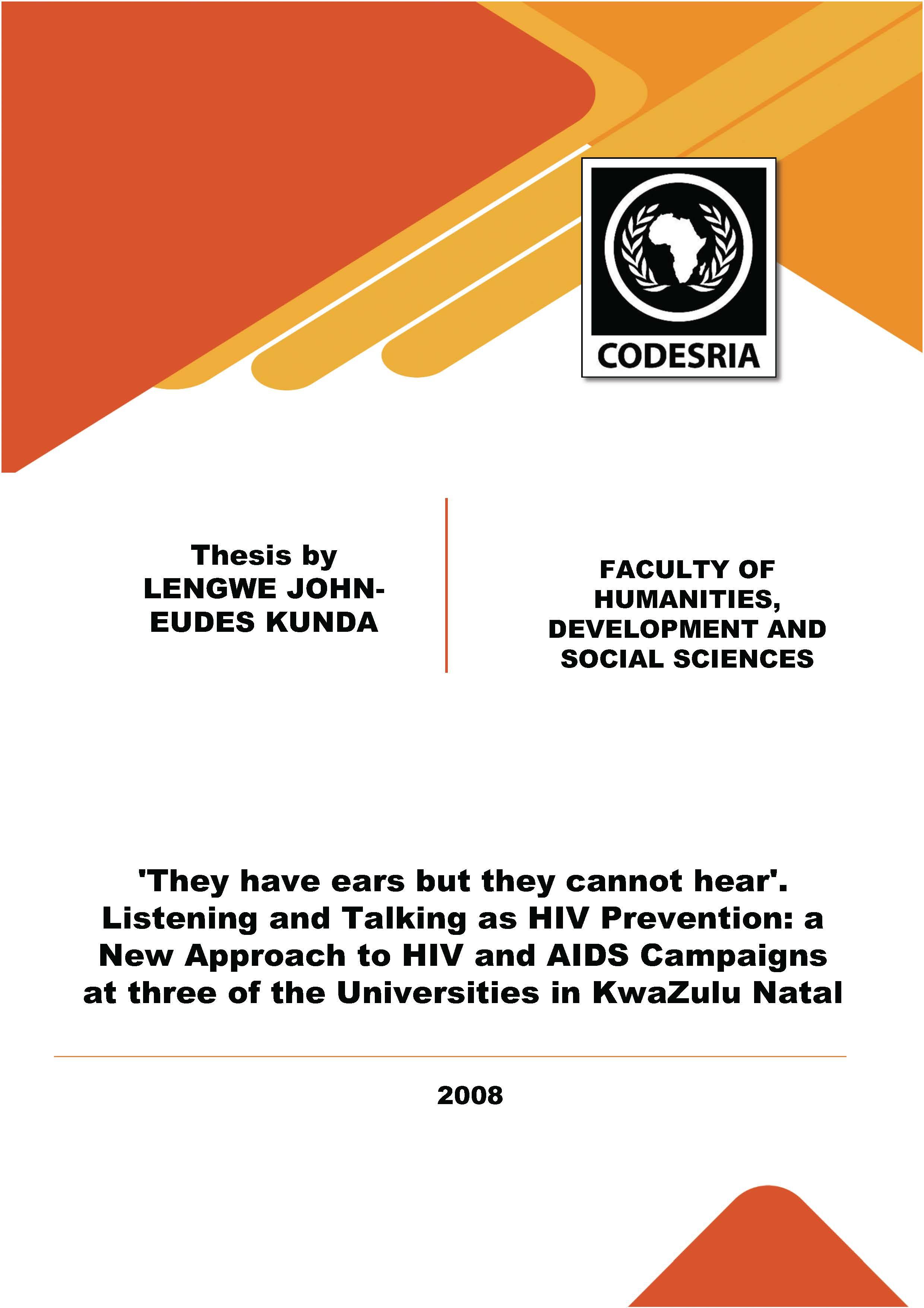'They have ears but they cannot hear'. Listening and Talking as HIV Prevention: a New Approach to HIV and AIDS Campaigns at three of the Universities in KwaZulu Natal
Keywords:
Aids prevention, HIV, Aids, sexuality, language, sexual behaviour, condoms, ethnography, abstinence, sexual health, South Africa, Southern AfricaSynopsis
Sexuality is made relevant in the way language is used as a matter of the identity of a group or individuals. Sex, for human beings, is not merely instinctive behaviour. It is m_eaningful-cultural behaviour and as such is semiotically loaded with meaning. Listening and talking about sex highlights conventions, taken-for-granted assumptions about the way things have to be done. Language as the most powerful representational system shapes our understanding of what we do and how we do them in relation to sex. Our understanding of sexual scripts about the sexuality of a particular group of people is through language as a signifying practice. The study of listening and talking is not merely an investigation of how sex is talked about, but how respondents enact sexuality and sexual identity vis-a-vis its linguistically loaded forms of representations in a
variety of discourse genres. Representation and its inherent process of signification draws on lived experiences and the daily talk of people in interaction. A theoretical perspective is presented not as a model to be tested, but as testimony to the rich literature on the nature and function of language as a political arena, semiotically loaded with meanings that are taken for
granted. It is concluded that the appropriation of cultural myths is encoded in language and as such language is a legitimate area of inquiry especially in understanding sexual scripts in the context HIV/AIDS. The study engages reported high risk sexual encounters such as multiple and concurrent · partnerships, as well as unsafe sex practices which have been identified in literature as fanning the embers of the epidemic. Ideologies influencing developing communication campaigns in light of these discourses become a serious challenge as the conventional basis for such campaigns is in socio-cognitive theories, few of which can be assumed to apply with regard to the discursive representations of sexual practices and the inherent risks. Drawing on a cross-sectional survey of 1400 students on seven campuses, conceptually triangulated via focused-ethnography, listening analysis and discourse analysis, this research examines perceptions, interpretations, attitudes, and practices of sexuality and
HIV/AIDS. The research is a multi-method and inter-disciplinary approach located within cultural studies to interrogate the gap between knowledge, attitudes, beliefs and behaviour modification in the light of the HIV/ AIDS epidemic. This research discusses these findings and offers a critical appraisal of sexual behaviour in the context of ABC (Abstain, Be faithful, Condomise) as ideologically encoded in cultural and relational myths. I found that students are sexually active with reported multiple and concurrent sexual partnerships. Postgraduate students were less likely to report having had used a condom
at their last coital encounter compared with the often younger undergraduate students. Condom use continues to be a norm in the universities surveyed. This is truer for students who reported multiple sexual partnerships. Amongst the dominant scripts that came out in the ethnographic inquiry are: sex as uncontrollable biological drive; females are responsible for safe sex practices; strong social scripts elevate male sexual prowess and show disdain for female affirmative sexualities, risk is discounted using a form of post modern fatalism .(resistance to regulation); and physical status, based on appearance of a possible partner, is used to select 'sexually safe' partners. I have concluded that a deeper understanding of the cultural and sexual scripts obtained from students is critical for appropriate design and implementation of interventions aimed at
stemming the tide of the HIV epidemic. I have also demonstrated that interventions that only emphasise the rational dimensions of human behaviour are more likely to miss their target audience as sex is more than a choice of Cartesian rationality (linear choice).
Downloads
References
(2006) Sex from Plato to Paglia: a philosophical encyclopedia, Greenwood Publ Grp Inc. (2007) Mbeki's mistake. Nature, 448, 727-727.
ABELSON, R. P. (-1981) Psychological Status of the Script Concept. American Psychologist, 36, 715-729.
ADIMORA, A. A., SCHOENBACH, V. J. & DOHERTY, I. A. (2007) Concurrent Sexual Partnerships Among Men in the United States. Am J Public Health, 97, 2230-2237.
ADLAND, S. R. (2006) Maria Goretti: An Icon of Virginity,·an Icon of Silence, an Opportunity for change.. Department of Religion. Haverford, Haverfold College.
AHLBERG, B. M. (1994) Is There a Distinct African Sexuality? A Critical Response to Caldwell. Africa: Journal of the International African Institute, 64, 220-242.
AIRHIHENBUWA, C., & OBREGON, R (2000) A Critical Assessment of Theories/Models Used in Health Communication for HIV/AIDS. Journal of Health Communication, 5, 5-15.
AJZEN, I. (1991) The theory of planned behavior. Organizational Behavior and Human Decision Processes, 50, 179-211.
AKWARA, P. A., MADISE, N. J. & HINDE, A. (2003) Perception of Risk of HIV/AIDS and Sexual Behaviour in Kenya. J. biosci. Sci., 35, 385-411.
ALBURY, K. (1997) Romie-Erotica: Heterosexual Female Desire in the Picture. Media International Australia, 84, 19-27.
ALTMAN, L. K. (2005) Study Challenges Abstinence as Crucial to AIDS Strategy. The New York Times. New York.
ANSPACH, R. R.. & MIZRACHI, N. (2006) The field worker's fields: ethics, ethnography and medical sociology. Sociology of health and illness, 28, 713- 731.
ARMISTEAD, N. (Ed.) (1974) Reconstructing Social Psychology, Harmondsworth, Penguin.
ATKINSON, P., COFFEY, A., DELAMONT, S., LOFLAND, J. & LOFLAND, L. (Eds.) (2001) Handbook of Ethnography, London, Thousand Oaks, New Dehli, Sage Publications.






